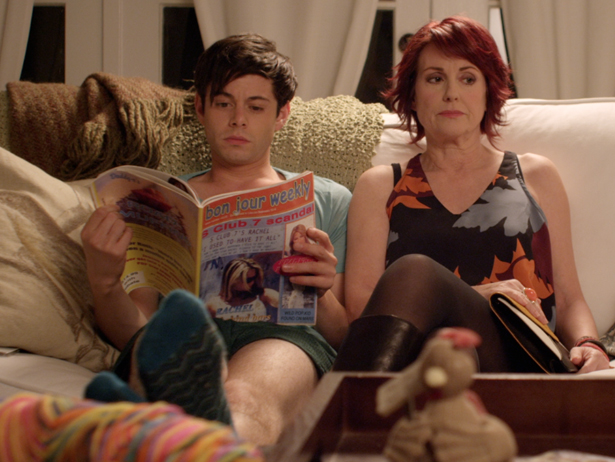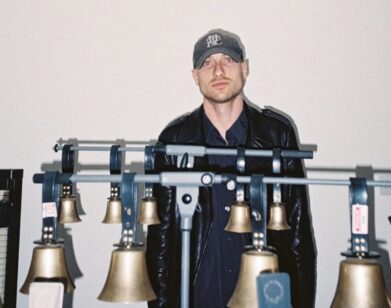Megan Mullally is a Born Performer

ABOVE: PAUL IACONO AND MEGAN MULLALLY IN G.B.F.
“Coming out” stories are often tragic. Occasionally, they are heartwarming. They are rarely, however, as impressively absurd as the tale of closeted best friends Tanner (Michael J. Willett) and Brent (Paul Iacono) in the film G.B.F. (aka Gay Best Friend). Tanner and Brent attend a suburban high school divided into three cliques, each ruled by radically different designer-clad, blown-out glamazons: Regina George-inspired Fawcett (Sasha Pieterse), brassy drama club star Caprice (Xosha Roquemore), and the very Mormon, Stepford wife-in-training ‘Shley, a cringeworthy shortening of Ashley (Andrea Bowen). The school’s LGBT club is presided over by Soledad (JoJo), who desperately wants to find actual gay students to join, to the bemusement of teacher mentor Ms. Hoegel (Natasha Lyonne). Incidentally, while Brent has contented himself with socializing with other gay men via a Tinder-like app, he longs to come out to the whole school. After a teen mag declares the hottest new accessory to be a G.B.F., Brent tries to convince a reluctant Tanner that the world is ready to accept them—after all, Fawcett already has every other bag, bracelet, and shoe that the magazine featured. Unsurprisingly, it all comes to a catastrophic head: Soledad puts a track on the gay dating app Brent uses, and Tanner, who is accidentally carrying it, is exposed to the entire school. In very Judgment-of-Paris style, the three clique queens go to war over who will claim Tanner as their G.B.F. using flattery, attention, and a very satisfying amount of “zinger”-laden passive aggressiveness as their weapons.
Things don’t exactly go as Brent planned; and to add insult to injury, Tanner, angry at the mixup, outs him to his mother, Mrs. Van Camp (Megan Mullally), and refuses to speak to him. With her hennaed, punk-style pixie cut, Mrs. Van Camp is no ordinary suburban mom, and her love for Brent has all the hilariously misguided good intentions to prove that. Delighted to finally have her (very strong) suspicions about her son’s sexuality confirmed, Mrs. Van Camp sets out to make Brent feel as comfortable as possible, whether it’s narrating the sex scene in Brokeback Mountain to him or complimenting his date to prom, Caprice, on how realistic she looks for a transvestite. (She’s not a transvestite.)
While gracefully navigating her way through LAX, Mullally spoke to us over the phone about her complex relationship with airport security guards, improvising most of her scenes, and how she came out of the womb.
HANNAH GHORASHI: Do people recognize you at the airport?
MEGAN MULLALLY: No, nobody ever recognizes me. I mean yeah, occasionally, but it’s not like a melée. Far from it. When I’m with Nick [Offerman, Mullally’s husband], he is imminently recognizable, and that’s a different story. I just kind of fall through.
GHORASHI: That’s nice.
MULLALLY: I’m a big hit with guards at security. They’re the center of my fan base, the airport security guards.
GHORASHI: [laughs] Yeah, they get to have fun if you decide not to go through the scanner.
MULLALLY: [laughs] Oh, they do! I did that for a long time but I just stopped doing it, I just thought “Oh, well.” Getting cancer is better than this.
GHORASHI: So, G.B.F. is quite a film. When I first watched it I was surprised because I didn’t think it was going to be as darkly satirical as it is. It felt a lot like Mean Girls or Heathers. When you were reading the script, were you surprised at all? Had you been expecting something different?
MULLALLY: It’s very stylized, but I just thought it was good writing and I thought I could maybe not be horrible in the role. That’s why I did it. And I only really worked on it for two or three days.
GHORASHI: Really? Wow.
MULLALLY: Yeah. I was down in the trenches with everyone for the fall shoot, and I just kind of breezed in and did my thing. So even though I really liked the script, a lot of scenes ended up being super fun, especially that scene where I’m narrating Brokeback Mountain—that was completely improvised. And a lot of the dialogue in that first scene where I walk into the bedroom and I’m afraid that [Tanner and Brent] are going to be naked or something.
GHORASHI: Those are the funniest parts. I felt really endeared towards your character because I felt like her heart was so much in the right place, she was just held back by this… complete lack of political correctness, but also ignorance. What did you think was her biggest flaw? And when you were preparing for the role, did you have anyone in mind?
MULLALLY: No, I didn’t really. I just felt like she tries to make [Brent] feel comfortable and that it has the exact opposite effect: it makes him feel incredibly uncomfortable. My mom was extremely supportive of me, but it could err on the side of… I mean, there’s supportive, and then there’s just full-on, over-hovering. But she was a great mom, it’s just that there’s a limit. If I had to sit with either one of my parents at that age and watch that scene [in Brokeback Mountain where Ennis Del Mar and Jack Twist have sex], having it narrated for the purpose of getting me to come out…That would be relatively hard to take. [laughs] But she’s coming from a good place. Most parents don’t want their children to be gay or express displeasure at the idea of it, and she’s so fine with it that that ends up becoming its own irritating problem.
GHORASHI: Have you ever considered someone your “gay best friend” or a token friend in any way?
MULLALLY: Well, I certainly have gay friends, but I don’t remember thinking, “Oh my god, I have this friend, and they’re gay, and that’s so cool.” I mean, I was very naïve until I got to a certain age. I had a lot of friends for a long time who were gay and I didn’t even realize it for awhile. Even in my mid- to late 20s, I was still pretty naïve about it.
GHORASHI: At my high school, for example, there were upwards of a thousand kids, and very, very few were out.
MULLALLY: I don’t know how old you are, but there weren’t any gay kids at my high school either. But there also weren’t any black kids or any Hispanic people or any Jews. [laughs]
GHORASHI: When you started acting, did you have a transitional moment when you thought, “Ok, maybe I don’t have to live in my parents’ basement and be a telemarketer for the rest of my life, I can actually do this professionally?”
MULLALLY: From the time I was three, I was already fully ready. It was all I ever really thought about, or did, or wanted to do. I was an only child and I spent a lot of time alone in my room making up dramatic dances to music and having my mom come in to watch. I was very shy and hadn’t really talked a lot. Then, when I was three, I barreled down the stairs and my parents and my grandparents and two other couples were having cocktails and I threw my arms out to the side and yelled out, “Ladies and gentlemen, introducing the world’s greatest clown.”
GHORASHI: [laughs]
MULLALLY: And then I tapped, which I hadn’t thought out at all. I don’t know, I think I just came out of the womb in a top hat and tap shoes. I was just like that. It was just my thing.
GHORASHI: When did people first start telling you that you were funny?
MULLALLY: I think people would tell me I was funny when I would do certain plays or musicals, and then I did a few other comedies on television before Will & Grace. I did Seinfeld and Fraser and a couple of the better, bigger shows. And people thought I was funny and I knew that I could get comedy jobs but I didn’t think I was particularly funny before Will & Grace, and then I thought, “I actually have an aptitude for this. A particular aptitude for this that other people don’t necessarily have, to this degree.” So that’s when I first really thought that. I guess I just didn’t really have as much confidence before that.
G.B.F. COMES OUT IN LIMITED RELEASE TOMORROW, JANUARY 17.






